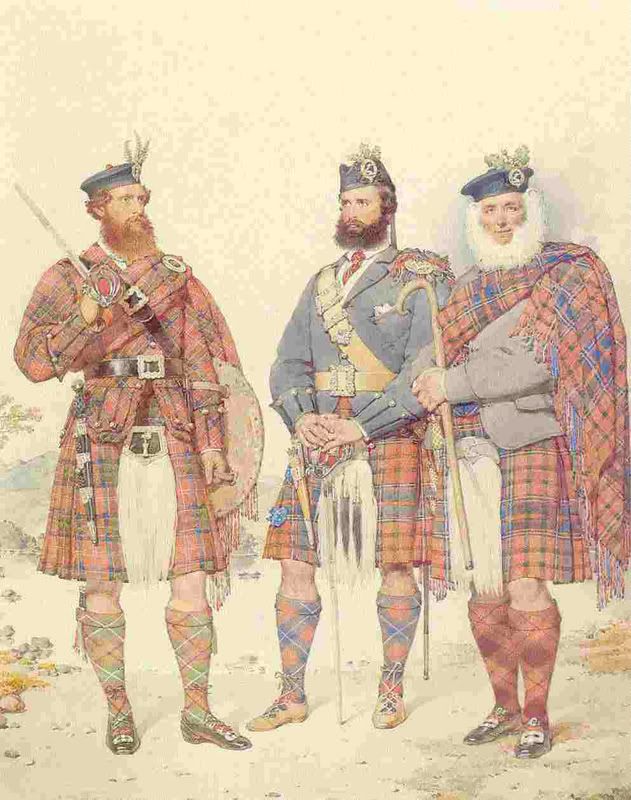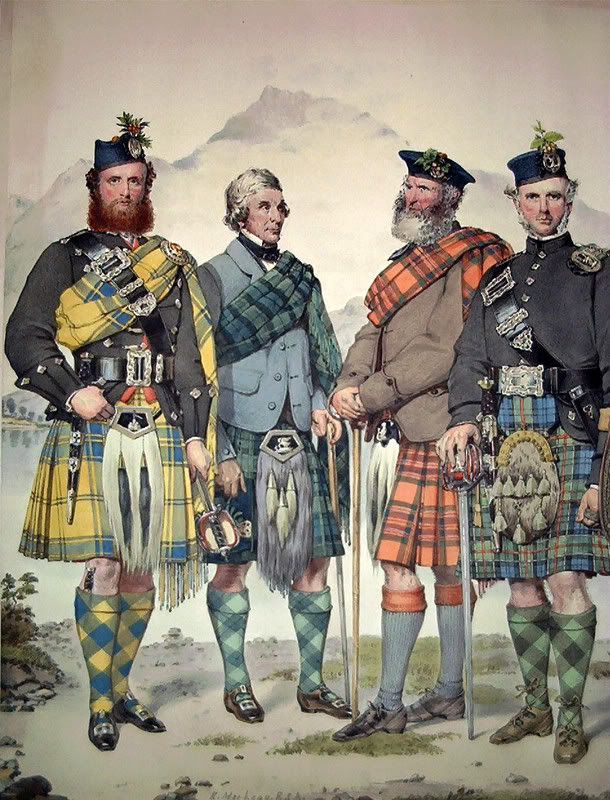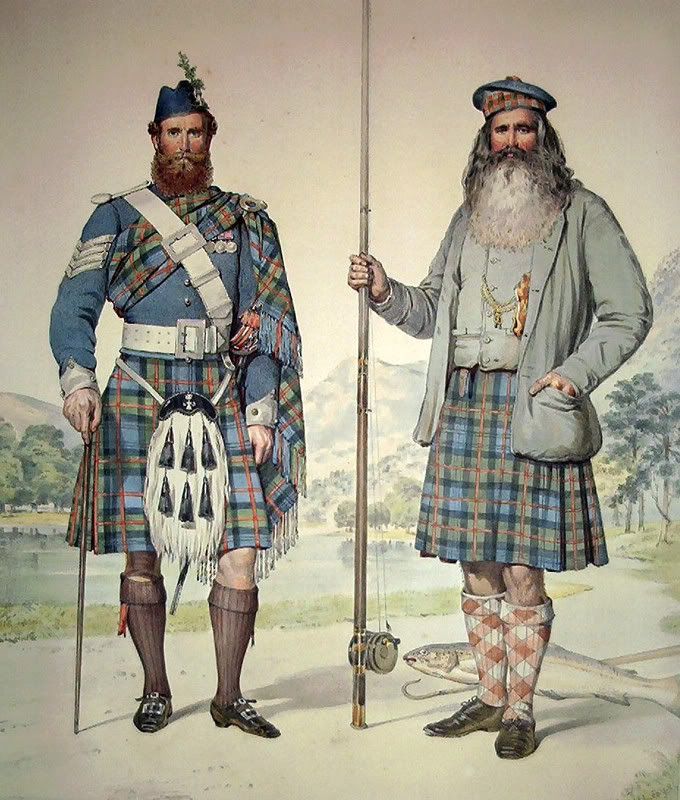|
-
6th February 08, 04:15 PM
#31
 Originally Posted by Nanook

Hard to accept given that we have a coatee in the closet of said style dated from 1921 (Wm Anderson Edinburgh). It has all the design elements but rather than black its a very dark archer green (looks black except in the glare of sunlight) and its buttons are solid sterling silver balls. The colour, I think, is the real give-away to its pedigree (today: Kinloch Anderson) as the case of other formal and dress attire: the military. I have little to believe that the style did not predate the great war.
Thanks for the info! Thus far the earliest dated jacket I've found is either 1936, 1938, or 1939; the label is smudged and the last number is almost undecipherable. That was the reason for my post 1935 statement. Anyhow, I'd be delighted to see a picture of the jacket-- any chance you could post one?
As to the colour-- it was probably black to begin with, not Archer green. Many old black garments have acquired a greenish hue over the years due to a shift in colour as a result of the cleaning processes then in use.
As military uniforms are usually derived from the civilian clothing of the period, and not the other way around, I suspect that the Prince Charlie coatee (what ever it's antiquity) owes more to the cut-down tails coat worn by a gentleman then it does a piece of military clothing.
-
-
7th February 08, 02:02 AM
#32
 Originally Posted by MacMillan of Rathdown

Anyhow, I'd be delighted to see a picture of the jacket-- any chance you could post one?
I see if I have a chance.
As to the colour-- it was probably black to begin with, not Archer green. Many old black garments have acquired a greenish hue over the years due to a shift in colour as a result of the cleaning processes then in use.
The iron complexes and dye deterioration tend to be towards green/brown and patchy rather than consistent. Although the garment is pushing 90 the dark green really does appear to be a very dark green (looking also at the silk bits). I need to look at it again.
As military uniforms are usually derived from the civilian clothing of the period, and not the other way around,
Here too I would have to disagree. Most of Savile Row as well as Highland garb specialists such as Wm Anderson were outfitters of military uniforms.
I suspect that the Prince Charlie coatee (what ever it's antiquity) owes more to the cut-down tails coat worn by a gentleman then it does a piece of military clothing.
The cut-down tails coat--- short Spencer Jacket--- became quite the rage among dandies in the late 1790s and was quickly morphed by others with military touches into the Hussar. The tails coat itself only became mainstream decades later in Regency period--- when everyone seemed to want to dress like Beau Brummell. The basis of the look, however, was as much military as civilian and the "civilian" elements more imported from the Continent (French revolutionary style) than home grown. One needs to recall the impact of Napoleon Bonaparte on French fashion in the early 1880s. This also lead to rather spectacular uniforms. The Napoleonic Wars, in turn, exposed these military uniforms to a very wide audience and elements were feed back into civilian design. There were, of course, within Europe much counter-reaction to ""Sans Coulotte", none-the-less, French Revolutionary style also ended the dominance of breeches and brought forth the style of trousers.
-
-
7th February 08, 09:37 AM
#33
 Originally Posted by ccga3359

Of course not, although Mel Gibson does have an uncanny resemblance to Sir William Wallace 9especially the height thing) and may be a direct descendant. ....
How would anyone know if Gibson looks like Wallace?
There are no surviving contemporary portraits of Wallace, and it is unlikely that any ever existed. Portraits were almost never made of people of his social standing at that time and place. Even if there were, portraiture at the time was usually stereotypal, and not very good a showing individual features. Further, like most men of his time, Wallace probably had long hair and a beard that would have covered most of his face, obscuring his features and rendering them invisible to an artist.
It is impossible that Gibson, or anyone else is an identifiable descendant of Wallace. He had no known children, nor did he leave any known collateral descendants through any brothers, sisters, aunts, uncles or cousins. This topic was the subject of a thread of two here, as well as a recent one at the Wallace surname board at rootsweb.com.
Though many---possibly hundreds ---have bragged of their direct descent from William Wallace over the centuries, it just isn't so. It's yet another of those gentle lies that people tell about their ancestry.
Last edited by gilmore; 7th February 08 at 09:42 AM.
-
-
7th February 08, 10:12 AM
#34
 Originally Posted by gilmore

How would anyone know if Gibson looks like Wallace?
There are no surviving contemporary portraits of Wallace, and it is unlikely that any ever existed. Portraits were almost never made of people of his social standing at that time and place. Even if there were, portraiture at the time was usually stereotypal, and not very good a showing individual features. Further, like most men of his time, Wallace probably had long hair and a beard that would have covered most of his face, obscuring his features and rendering them invisible to an artist.
It is impossible that Gibson, or anyone else is an identifiable descendant of Wallace. He had no known children, nor did he leave any known collateral descendants through any brothers, sisters, aunts, uncles or cousins. This topic was the subject of a thread of two here, as well as a recent one at the Wallace surname board at rootsweb.com.
Though many---possibly hundreds ---have bragged of their direct descent from William Wallace over the centuries, it just isn't so. It's yet another of those gentle lies that people tell about their ancestry.
I think Grant was taking the piss....
I feel for the people that visit the statue in Stering and really think that is what Wallace looked like

-
-
7th February 08, 10:38 AM
#35
 Originally Posted by ccga3359

A fictitious kilt check is still a kilt check  ! So when did the kilt pin make an appearance? We are looking to get Farlander kited up for the mid to late 1800 Scotland.
Here is a pic of Queen Vic's favourite Scot; John Brown.

I notice that John Brown is wearing what we would today call a horsehair sporran, something considered inappropriate for non-military/pipe band use.
When did this change? Anyone?
-
-
7th February 08, 10:52 AM
#36
 Originally Posted by Prester John

I notice that John Brown is wearing what we would today call a horsehair sporran, something considered inappropriate for non-military/pipe band use.
When did this change? Anyone?
Notice that his sporran is different. Military ones are cut straight at the bottom, whereas Brown's is rough and scraggly. I've seen this kind worn by civilians nowadays, but have been unable to find one myself.
-
-
7th February 08, 11:31 AM
#37
 Originally Posted by BoldHighlander

I thought the original post'er (is that correct?) of this thread would like to see some period Victorian photos of John Brown in his everyday wear.
Sure, the original poster (as in ME) is interested in Victorian Scottish wear. John Brown pictures are a fine example.
Thanks!
Michael the Farlander
Loch Sloy!
-
-
7th February 08, 11:39 AM
#38
 Originally Posted by Prester John

I notice that John Brown is wearing what we would today call a horsehair sporran, something considered inappropriate for non-military/pipe band use.
When did this change? Anyone?
Not a complete answer, but two references to changing sporran fashions taken from the Scottish Tartans Authority website.
Basically the costume for civilian wear may also be said not to have altered since the 18th century. Yet, in matters of detail, each generation has introduced modifications, and even modern fashions have appropriately exerted their influences, though curiously enough, they have in matters of Highland dress in many ways lead to rediscovery of both the practical and artistic advantages of the older Scottish styles which, during the 19 century, had tended to become more oppressive in cut and decoration. As an example of minor changes in taste, the sporran of an all-white goat hair, almost universally the fashion during the Victorian age, has to a great extent given place to a smaller sporran of sealskin, often elaborately decorated with pierced and engraved silver mountings.
http://www.tartansauthority.com/Web/...eartheKilt.asp
The Sporran
Since Highlanders didn't have any pockets in their kilt they needed something to carry their bits and pieces in - including the lead shot for their muskets - and the earliest sporran was a plain draw-string bag of cloth or thin leather that was hung around the waist. More affluent Highlanders decorated their sporrans with a silver top and tassels.
As time went on the sporrans became even fancier and by the late 1800s the sporan molach or hair sporran appeared — made of animal skins such as otter, badger, goat and seal. In Victorian times the sporrans got so huge and fancy that they almost covered the front of the kilt.
http://www.tartansauthority.com/Web/...land_Dress.asp
Best regards,
Jake
[B]Less talk, more monkey![/B]
-
-
7th February 08, 11:43 AM
#39
 Originally Posted by Prester John

I notice that John Brown is wearing what we would today call a horsehair sporran,
The sporran is probably NOT horsehair but goat hair.
something considered inappropriate for non-military/pipe band use.
That view seems most advocated by pipers--- and most loudly by those that shun Nr1 dress.
When did this change? Anyone?
Probably starting in the 1960s.
-
-
7th February 08, 11:47 AM
#40
More MacLeay paintings:



Granted, these guys are pretty decked out, but then again, it was the Victorian era.
-
Similar Threads
-
By jsethmccall in forum Kilt Advice
Replies: 25
Last Post: 27th April 07, 12:23 PM
-
By JohnL in forum Kilt Advice
Replies: 1
Last Post: 23rd September 05, 09:25 AM
-
By toadinakilt in forum How to Accessorize your Kilt
Replies: 11
Last Post: 15th September 05, 06:22 PM
 Posting Permissions
Posting Permissions
- You may not post new threads
- You may not post replies
- You may not post attachments
- You may not edit your posts
-
Forum Rules
|
|


























Bookmarks